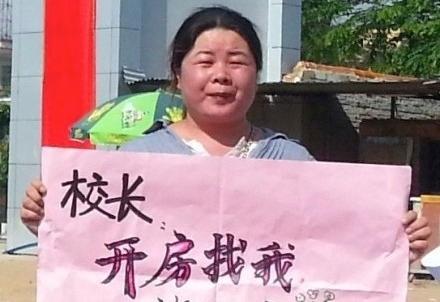In China, Thursday, May 30 was a study in contrasts.
While dozens of websites featured images of Party leader Xi Jinping in his red kerchief, surrounded by beaming Chinese children for International Children’s Day, and affirming that “actions and speech that harm children and youth’s rights... should be prevented at all costs and cracked down upon according to law,” female activist Ye Haiyan was having her door kicked in.
Ye was guilty of protesting against elementary school principal Chen Moupeng in Wanning City, Hainan Province, who on May 8, along with an associate, took six of his female students to a karaoke bar and then to a hotel room for the night. The girls were aged 11 to 14.
Five of the parents later informed the Beijing Times that medical examiners found their daughters with ruptured hymens; they believe the girls were drugged and then sexually molested by Chen and his accomplice. City authorities denied it.
To make an example of Chen, Ye Haiyan stood outside No. 2 Primary School in Wanning, with other activists, and held a placard that read, “Principal, if you want to get a hotel room, come and get me. Leave the children alone!”
A photo of Ye with her sign circulated on China’s microblogging service, Sina Weibo, and the gesture quickly became a protest meme: Dozens of netizens, mostly female, posted their own versions.
But then Ye became a target. Nine women and two men broke into her home on Thursday afternoon, while she was being interviewed by Voice of America (VOA), and proceeded to beat her. She suspects they were sent by the local government as punishment for her protest on Monday.
The scuffle was caught on audiotape: several people were heard shouting, while Ye said to the reporter, “They are beating me!” There was loud commotion in the background.
The reporter hung up and called back, to the sounds of a policeman urging Ye to open the door while she shouted refusals. It was unclear from the report how the first intruders were ejected from her home. About 20 minutes later, her phone was shut off. She was brought to the Bobai County police station in Guangxi Province and detained there for several hours.
In the two weeks following the Wanning City scandal on May 8, eight other incidents of school principals and teachers sexually abusing female students were exposed by Chinese media.
Official abuse of youth became a focus of public attention, with netizens lambasting the authorities for a culture of abuse of power and unaccountability, and state media going on the offense against them.
In response to the online fervor over Ye’s protest, the official news agency Xinhua released a statement condemning her: “Punishing a principal who sexually molested young girls is a grave issue, but Ye Haiyan rashly turned the principal’s shameless behavior into performance art. She is taking advantage of the shameless principal [incident] to carefully craft a show and please the crowd with nonsense, sensationalist talk.”
Zhu Xinxin, a freelance writer and former editor at Hebei Radio, said in an interview with the Sound of Hope Radio that Ye’s placard protest was a new kind of black humor response to the misdeeds of Party officials.
“Under the Chinese regime, government officials not only abuse their authority to seek personal gains, but also to satisfy their own selfish desires,” she said.
“However, with the power of public opinion on the Internet, these officials’ despicable deeds are being exposed to the world, resulting in more and more people—possibly the whole world—recognizing the evil of the Chinese Communist Party’s dictatorship.”
Making reference to the “China dream,” an oft-repeated slogan of Xi Jinping meant to rally the Chinese people behind the Communist Party, Zhu remarked: “In reality, they cannot even protect a child. How can they talk of a Chinese dream?”
Translation by Leo Chen and Sophia Fang. Research by Ariel Tian and Feng Hao.





